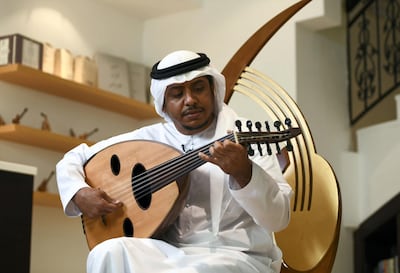Following your dreams can require a leap of faith. But for Abu Dhabi oud player, composer and teacher Mohammed Dohai his passion for the classical Arabic instrument proved overwhelming.
Having spent a decade as a civil inspector, working on engineering projects in the UAE, six years ago the Yemen-born father of two made the bold move to dedicate himself to the oud full-time.
From overseeing irrigation and stormwater projects, Dohai went to performing overseas, playing live on TV to millions and becoming an instructor at the Abu Dhabi branch of Bait Al Oud – the prestigious international conservatory dedicated to the challenging instrument.
"My mother, my family, asked me to keep the oud as a hobby," Dohai, 41, told The National. "But, if I don't play it every day, I feel there's something wrong. It's like a kind of meditation or getting positive energy."
Watching Dohai play an original composition in Bait Al Oud’s airy villa, it is clear that he is a natural. But it is a talent buttressed by years of painstaking practice.
Before he started as a Bait Al Oud instructor in 2015, Dohai had to play for an audience at the institute. “We had to practise a long time,” he says. “I remember it was like eight hours or 10 hours. Sometimes, I’d be holding the oud, then I’d feel tired and wake up the next day, still holding the oud. And I’d be dreaming that I was still practising.”
It has been a long journey since Dohai’s brother Adnan – a pianist and composer – introduced him to the oud in 1996, bringing one back from a trip to Cairo. Dohai’s father Saeed Mohammed Dohai – a veteran Abu Dhabi journalist and poet – gave him some music books to study, before he found teachers in Zaydoon Triko and Salem Abdulkareem, both renowned players in their own right.

Long years of balancing his day job for Dorsch Group with his passion for music followed. In 2013, Dohai composed an oud soundtrack for the Abu Dhabi short film Madrasa but his move to Bait Al Oud, under the direction of Iraqi virtuoso Naseer Shamma, led to a string of high-profile performances at home and abroad.
Among these was a unique event at Al Jahli Fort, Al Ain in 2017. Here, he collaborated with famous French equestrian and choreographer Bartabas, who guided a horse around Dohai who was playing a haunting melody.
That year he represented the UAE at a National Day event in Latvia and was part of an international orchestral performance led by Shamma at the King Abdulaziz Centre for World Culture in Dhahran, Saudi Arabia.
In April 2019, Dohai performed at the International Oud Forum in Fujairah and in June he played on pan-Arab channel MBC's Sabah Al Khair Ya Arab morning programme to an audience of 130 million, accompanied by Adnan, the brother who introduced him to the oud all those years ago.
Although Covid-19 is curtailing performances, Dohai continues to teach at Bait Al Oud, bringing his experience even to those who have just picked up the instrument . It is these raw recruits he enjoys coaching the most.
“Beginners are much better because when a student comes, maybe he has been playing for two years already and maybe he has some mistakes,” he said.
“So, I have to fix these mistakes, which takes more time than the beginners, whose position is easier and they will follow your instructions.”
But why the oud – a tricky instrument that takes hours of daily practise to master? “It is like when you find something you are looking for,” Dohai said.
“When I found the oud, I felt: ‘This is what I want.’”

